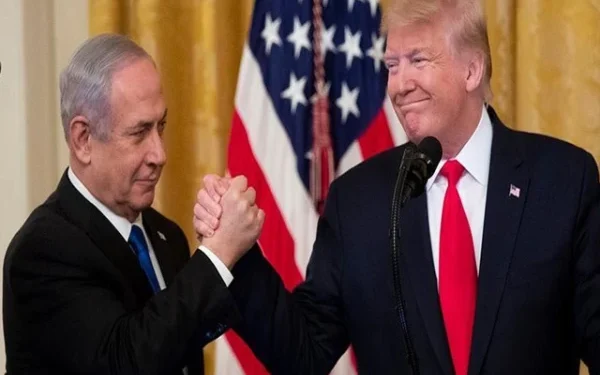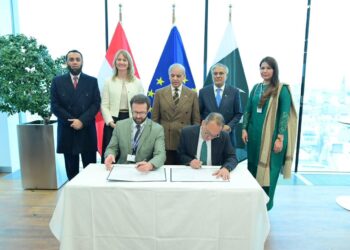Washington, D.C. – Former U.S. President Donald J. Trump has voiced strong opposition to the recognition of a Palestinian state, declaring that such recognition would be akin to offering relief or a political reward to Hamas, the militant group governing the Gaza Strip. In his remarks to the media at the White House, Trump emphasized that the topic of a two-state solution was not even broached during his recent discussions with the British Prime Minister.
“There was no discussion with the British Prime Minister on the two-state solution,” Trump stated firmly. “And we have not discussed recognizing a Palestinian state, either.”
Trump’s statements come amid heightened international debate over the ongoing Israel-Palestine conflict, especially following the devastating conflict in Gaza, which has resulted in thousands of casualties and widespread destruction. His comments signal a continued hardline stance and diverge significantly from efforts by the international community, including the European Union, United Nations, and even previous U.S. administrations, to promote a peaceful resolution through the establishment of two states living side by side.
Trump’s Position: Recognition Equals Relief for Hamas
President Trump clarified that in his view, acknowledging Palestinian statehood under current circumstances would be tantamount to legitimizing Hamas, which he referred to as a violent extremist organization responsible for severe human rights abuses and terrorism.
“Recognizing a Palestinian state right now is essentially giving a reward to Hamas,” he said. “And I believe Hamas deserves no relief—no political advantage, no legitimacy.”
Trump’s comments reflect a belief that any move toward state recognition for Palestinians—especially without meaningful disarmament or the removal of extremist elements like Hamas—would undermine the fight against terrorism and reward aggression with sovereignty.
Context: Gaza Conflict and Global Reactions
Trump’s remarks come in the backdrop of one of the most destructive military confrontations in Gaza in recent years. The latest round of fighting, which began after a surprise attack by Hamas militants on Israeli territory, has led to a full-scale military response from Israel, resulting in the deaths of thousands of Palestinians, including civilians, and the flattening of entire neighborhoods in the Gaza Strip.
The international community has been increasingly vocal in calling for a ceasefire, humanitarian access, and a renewed push for peace negotiations. Many countries, including Ireland, Spain, and Norway, have either recognized the State of Palestine or indicated plans to do so. These moves have drawn sharp criticism from Israel and now from Trump as well.
Two-State Solution: A Historical Overview
The two-state solution has long been regarded as the most viable framework for resolving the Israeli-Palestinian conflict. The concept envisions an independent State of Palestine alongside the State of Israel, coexisting peacefully based on pre-1967 borders, with negotiated land swaps, security arrangements, and guarantees for both peoples.
However, Trump’s rejection of the two-state framework is not new. During his presidency (2017–2021), he deviated from traditional U.S. policy in significant ways:
Trump’s Actions During His Presidency:
- Moved the U.S. Embassy to Jerusalem, recognizing the city as Israel’s capital, a move condemned by Palestinians and much of the world.
- Cut funding to UNRWA, the United Nations agency for Palestinian refugees.
- Brokered the Abraham Accords, normalizing relations between Israel and several Arab countries including the UAE, Bahrain, Sudan, and Morocco—without including Palestinians in the process.
- Released a controversial “Deal of the Century” peace plan in 2020 that was seen as heavily skewed in Israel’s favor, granting them sovereignty over large parts of the West Bank.
These actions have firmly placed Trump in the camp of pro-Israel hardliners, diminishing his credibility in the eyes of Palestinian leaders and making his administration the least sympathetic to Palestinian aspirations in modern U.S. history.
British Government’s Position: A More Balanced View
Trump also clarified that there was no discussion with the British Prime Minister—likely referring to Rishi Sunak—regarding the recognition of Palestine or the two-state solution.
The UK, while traditionally aligned with the U.S. and Israel, has often expressed support for a negotiated two-state solution. British officials have, however, avoided unilateral recognition of Palestine and instead support a negotiated settlement. Despite pressure from within the Labour Party and European allies, the UK has stopped short of recognizing a Palestinian state without parallel peace negotiations.
Critics Respond: Accusations of One-Sidedness
Trump’s latest remarks have sparked criticism from various international and domestic observers who argue that refusing to engage with the Palestinian cause only perpetuates violence and instability in the region.
Critics Argue:
- Conflating all Palestinians with Hamas is inaccurate and unjust, given that the Palestinian Authority (PA) governs parts of the West Bank and has engaged in peace talks in the past.
- Collective punishment of Palestinians, through military action and diplomatic isolation, strengthens extremist narratives and fuels radicalization.
- The lack of a political horizon for Palestinians undermines moderate voices and weakens efforts toward peaceful coexistence.
Human rights organizations, including Human Rights Watch and Amnesty International, have also expressed concerns that denying Palestinian statehood based solely on Hamas’ presence disregards the rights of millions of civilians who aspire to self-determination.
Hamas and the Palestinian Authority: A Divided Leadership
One of the major obstacles to a unified Palestinian front is the deep divide between Hamas and the Palestinian Authority (PA).
- Hamas, classified as a terrorist organization by the U.S., Israel, and the EU, controls the Gaza Strip and has engaged in repeated armed conflicts with Israel.
- The Palestinian Authority, led by Mahmoud Abbas, governs the West Bank and is considered the legitimate representative of the Palestinian people by the UN and most global institutions.
Trump’s refusal to recognize Palestine due to Hamas’ actions effectively punishes the entire Palestinian population, including those who live under the PA and who reject extremism.
Domestic Political Motives: Trump’s 2024 Strategy
Trump’s latest hardline position may also reflect domestic political calculations as he ramps up his campaign for the 2024 U.S. Presidential election. With evangelical Christian voters and pro-Israel lobby groups making up a significant part of his support base, tough rhetoric on Palestine and unwavering support for Israel are likely designed to mobilize these constituencies.
His stance may resonate particularly well with:
- Right-wing voters concerned about national security and terrorism.
- Christian Zionist groups that support Israeli sovereignty over biblical lands.
- American Jewish organizations aligned with pro-Israel advocacy.
International Reactions: Shifting Momentum Toward Palestinian Recognition
Despite Trump’s opposition, a growing number of countries are considering or have already announced recognition of Palestinian statehood, citing the urgency of a political solution amid worsening humanitarian conditions in Gaza.
Countries like Spain, Norway, Ireland, and South Africa have either formally recognized Palestine or are advocating for its recognition at the UN General Assembly.
These nations argue that recognition is a political tool to restart peace talks and that denying Palestinians a state only strengthens extremist factions like Hamas.
Conclusion: Trump’s Zero-Sum Approach Faces Global Pushback
Former President Donald Trump’s outright rejection of Palestinian statehood and his framing of such recognition as a reward to Hamas reflect a zero-sum, security-centric view of the Middle East conflict. While his comments align with the views of hardline Israeli officials and his conservative voter base, they clash with the broader international consensus that a two-state solution is the only viable path toward lasting peace.
As the humanitarian crisis in Gaza deepens, and as diplomatic pressure mounts from global actors to find a political solution, Trump’s opposition to Palestinian recognition may further isolate the U.S. from key allies if re-elected in 2024.
For millions of Palestinians, the dream of statehood remains alive. But for now, it is entangled in geopolitics, diplomacy, and power dynamics that continue to define the long and painful road to peace in the Middle East.

























